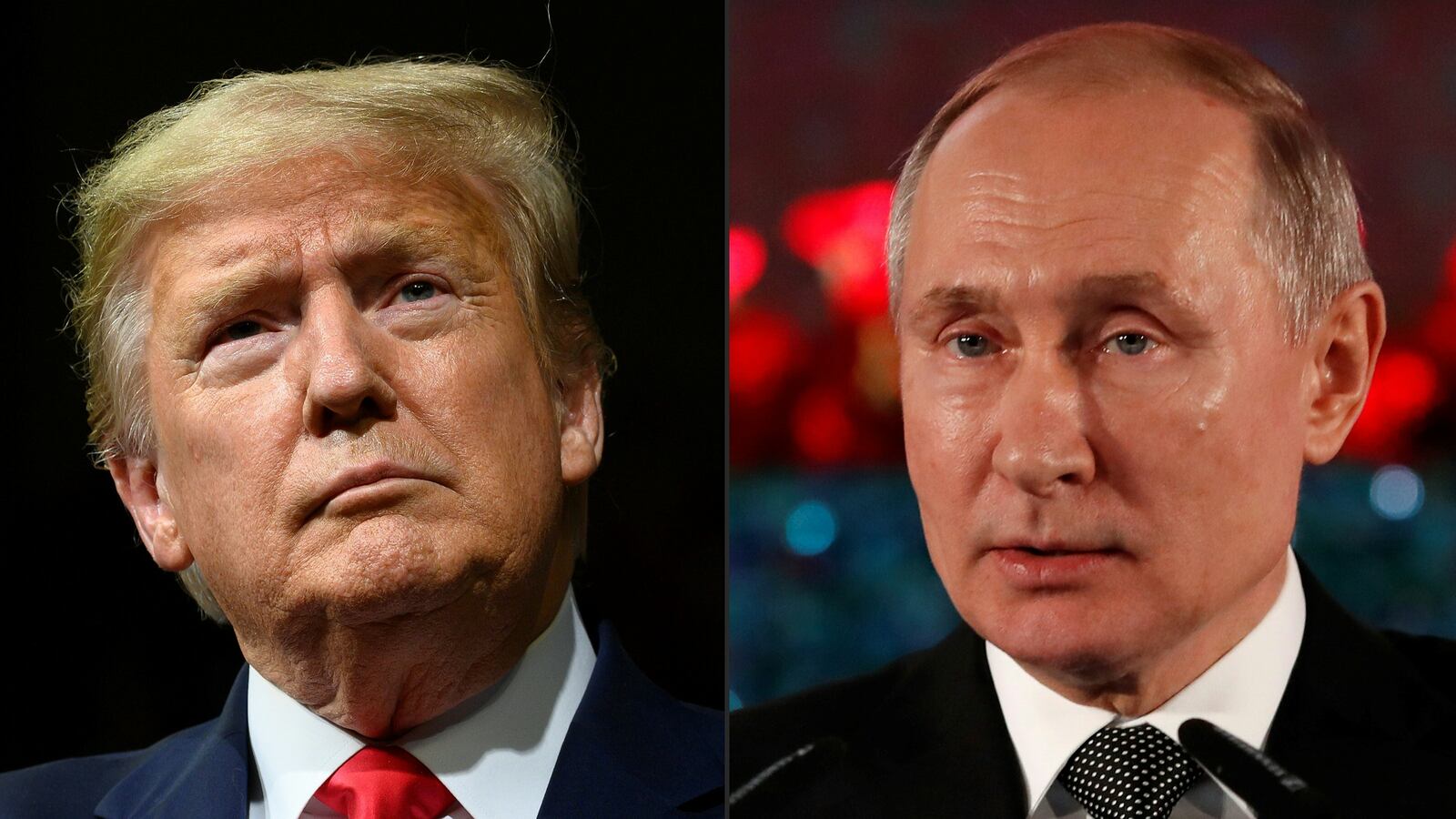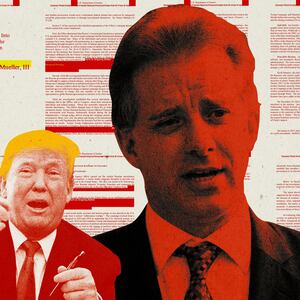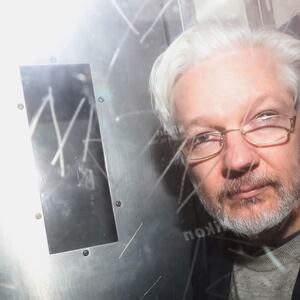The Senate Intelligence Committee has released its fifth and final report on Russia’s “aggressive, multifaceted effort” to interfere in the 2016 U.S. presidential election on behalf of Donald Trump.
The committee described its 966-page bipartisan report as “the most comprehensive description to date of Russia’s activities and the threat they posed.” The report goes further than Special Counsel Robert Mueller’s report by concluding that President Trump most likely did have advance knowledge of Russia’s hack of Democratic National Convention emails before WikiLeaks released them—contrary to what the president told Mueller’s team.
It also provides fresh evidence of Paul Manafort’s connections to Russian intelligence officers, establishing a clear pipeline between Russia and the top level of the Trump campaign. And it has new details of how the FBI handled the dossier from ex-British intelligence officer Christopher Steele.
But while it offers a damning assessment of the Trump campaign’s extensive contacts with Russia, its vulnerability to foreign manipulation, and its indifference to Russian interference, it does not conclude that the campaign engaged in a coordinated conspiracy with Russia.
Although the full committee signed off on the startling report, which took three years to compile and involved 200 witnesses, Democrats and Republicans ended up with wildly different interpretations about what it reveals about the Trump campaign.
Sen. Mark Warner (D-VA), vice chairman of the Senate Intelligence Committee, said in a statement that the report exposes the “breathtaking level of contacts between Trump officials and Russian government operatives that is a very real counterintelligence threat to our elections.”
Less than three months out from another presidential election, Warner added: “This cannot happen again.”
However, Acting Senate Intelligence Chairman Sen. Marco Rubio (R-FL) said the committee found “absolutely no evidence that then-candidate Donald Trump or his campaign colluded with the Russian government to meddle in the 2016 election.”
Trump 2020 communications director Tim Murtaugh chose to highlight just one instance of foreign interference outlined in the report. “The report does remind Americans that there was, however, political reliance on foreign assistance in 2016, since Hillary Clinton’s campaign and the DNC paid for the bogus Steele Dossier assembled by a foreign operative using Russian disinformation.”
‘A Grave Counterintelligence Threat’
The report says that Manafort’s high-level access to the Trump campaign and his willingness to share information with Russian and Ukrainian operatives—particularly Konstantin Kilimnik, who he’d previously hired and worked with, and oligarch Oleg Deripaska—represented “a grave counterintelligence threat.”
“[His] presence on the Campaign and proximity to Trump created opportunities for Russian intelligence services to exert influence over and acquire confidential information on the Trump Campaign,” it states.
The committee wasn’t able to determine why Manafort shared internal polling data and campaign strategy information with Kilimnik, or what Kilimnik did with it. However, the committee did obtain “some information” suggesting Kilimnik “may have been connected” to the Russian hack of Democratic emails.
The report goes further than Mueller’s report by classifying Kilimnik as a “Russian intelligence officer” who was an “integral” part of Manafort’s prior work in Ukraine and Russia, and worked closely with Trump’s campaign manager.
It also states that, after the election, Manafort continued to coordinate with Kilimnik and other Russian operatives to workshop “narratives that sought to undermine evidence that Russia interfered” in the election by instead fingering Ukraine. The committee concluded there was no evidence Ukraine was behind the interference.
The report goes further then previous public reports to conclude that two other key players, Natalia Veselnitskaya and Rinat Akhmetshin, who were at the infamous 2016 Trump Tower meeting aimed at providing Donald Trump Jr. and others with “dirt” on Hillary Clinton, “have significant connections to the Russian government, including Russian intelligence services.”
Manafort was convicted of financial crimes in mid-2018 and was released to home confinement amid the coronavirus pandemic, after serving almost two years of a seven-and-a-half year sentence.
Steele Dossier
The report addresses the Steele dossier, which made lurid accusations about potentially compromising material from Trump’s trips to Russia. The committee didn’t use Steele’s memos as evidence in their report and states that the FBI gave it “unjustified credence,” using it to obtain FISA warrants despite having an incomplete understanding of Steele’s past and the reliability of his sources.
But the committee says it independently became aware of “three general sets of allegations” involving women that were in the Steele dossier.
The first allegation, based on testimony and other witnesses, was made by Moscow businessman David Geovanis, who stated that “during Trump’s travel to Russia, both in 1996 and 2013, Geovanis was aware of Trump engaging in personal relationships with Russian women.”
The report states another businessman said in 2015 he overheard two people discussing “sensitive tapes of a Trump visit to Russia.” The information reached Trump’s longtime personal lawyer Michael Cohen, who told the committee he knew of other similar allegations from Trump’s travel to Moscow in 2013 that he was unable to corroborate.
Finally, the report states an executive at Marriott International overheard two colleagues “discussing how to handle a tape of Trump with women in an elevator at the Ritz Carlton Moscow.” The report stresses that the allegations were not confirmed.
The WikiLeaks Dump
The report concludes, for the first time, that the Russian government was the source of the hacked DNC emails, contrary to WikiLeaks’ and founder Julian Assange’s claims.
The committee says they found “significant evidence” to suggest WikiLeaks was knowingly collaborating with Russian government officials when it hacked and released the emails in an effort to derail Clinton’s campaign.
The report provides a detailed timeline of the release of the emails, which came about 30 minutes after The Washington Post’s Oct. 7 story on Trump’s Access Hollywood tape. Roger Stone, who was in contact with WikiLeaks, had a six-minute call the night before with a phone number belonging to Trump’s bodyguard Keith Schiller. While the substance of the call is unknown, “it appears quite likely that Stone and Trump [using his bodyguard’s phone] spoke about WikiLeaks,” the report concludes.
The Trump campaign first heard of the Access Hollywood tape about an hour before its release, the report says. Stone then called Jerome Corsi and, according to Corsi, told him to get Assange to “drop the Podesta emails immediately.”
WikiLeaks then released 2,050 emails that Russia had stolen from DNC chair John Podesta, the report says.
While the Senate committee found no evidence that Trump’s campaign knew for sure that the hack was done by Russia, the campaign was “indifferent” as to whether it and WikiLeaks were furthering a Russian interference effort.
The findings go further than Mueller’s report, which didn’t conclude that Trump knew about the WikiLeaks hack prior to its release and didn’t take a position on whether Trump was lying when he said in written answers to Mueller’s team that he didn’t recall ever discussing WikiLeaks with Stone during the campaign.
“Despite Trump’s recollection, the Committee assesses that Trump did, in fact, speak with Stone about WikiLeaks and with members of his Campaign about Stone’s access to WikiLeaks,” the report says.
Stone was found guilty of lying to Congress about his contacts with WikiLeaks, but Trump later commuted his prison sentence.
Inexperienced and Easy to Manipulate
The report is most critical of the Trump campaign’s general incompetence and vulnerability to Russian contact during the transition to the White House. It concludes that the Kremlin capitalized on the “relative inexperience” of Trump’s team—and the new president’s “desire to deepen ties with Russia.”
“The lack of vetting of foreign interactions by Transition officials left the Transition open to influence and manipulation by foreign intelligence services, government leaders, and co-opted business executives,” the report states.
The “disorganized and unprepared” transition team also actively engaged with foreign actors, which “created notable counterintelligence vulnerabilities” and allowed “Russian officials, intelligence services, and others acting on the Kremlin’s behalf” to exploit Team Trump’s shortcomings. The team repeatedly took actions that sometimes interfered with U.S. diplomatic efforts, were not part of a visible overriding foreign policy and were “narrow and transactional.”
“This created unnecessary confusion among U.S. allies and other world leaders, creating the potential to harm America’s ability to conduct diplomacy both bilaterally and in multilateral institutions, and undermine U.S. credibility and influence.”
Selling Out the National Security Council
The report provides new details about Robert Foresman, an American businessman who was named in Mueller’s investigation due to his high-level Kremlin contacts and alleged efforts to meet with Trump during and after the 2016 election.
Foreman testified that, at the end of a Dec. 6 meeting with chief strategist Steve Bannon, Bannon asked him to send a memo. In it, Foresman “offered advice for structuring the National Security Council so that Russia was a main focus of the council,” including the creation of a Russia-specific deputy national security adviser.
After submitting that memo, Foresman met with national security adviser Michael Flynn and told Flynn he was on his way to Russia to meet with people “close to President Putin.” He asked if the Trump team wanted to convey a message from the “incoming administration.”
“Flynn replied, ‘You can convey that on behalf of the President-elect and myself, we genuinely hope for improved relations between our two countries,’” the report states, adding that Foresman said that he conveyed the message to Russian banker Sergey Gorkov, who relayed the message to Putin.
Separately, Foresman, who wanted a position in the Trump administration, conveyed messages between the Trump campaign and several Kremlin-linked people, including Putin confidant Matthias Wamig, the report states.












